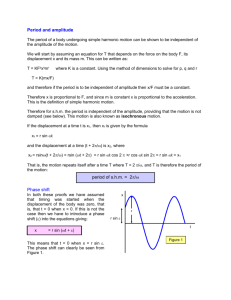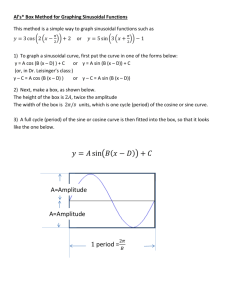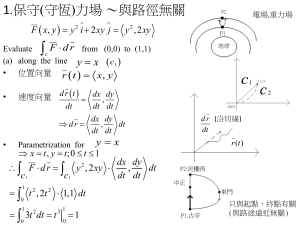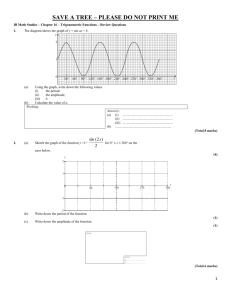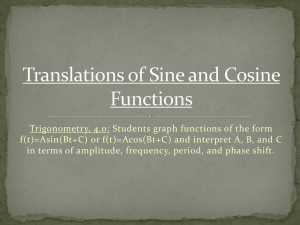Graphs of Sine and Cosine
advertisement
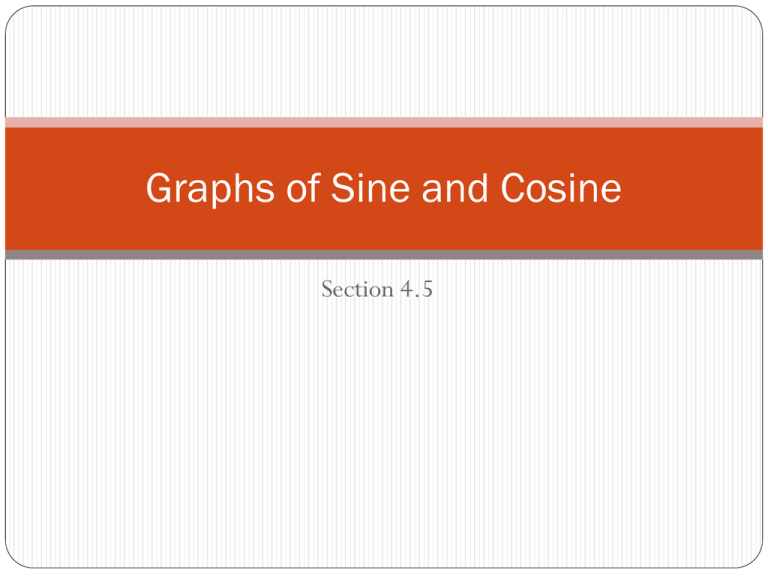
Graphs of Sine and Cosine Section 4.5 Sine Curve 1 2 π 3 2 2π -1 2 3 2 Key Points:0 π 2π Value: 0 1 0 -1 0 Cosine Curve 1 2 π 3 2 2π -1 2 3 2 Key Points:0 π 2π Value: 1 0 -1 0 1 Equations For the rest of this section, we will be graphing: y = a Sin (bx – c) + d y = a Cos (bx – c) + d y = Sin x a=1 c=0 b=1 d=0 Graph the equation y = 2 Sin x 2 1 -1 2 π 3 2 2π -2 2 3 2 Key Points:0 π 2π Value: 0 2 0 -2 0 Amplitude (a) Half the distance between the maximum and minimum values of the function Given by the value of │a │ Graph the functions: y = 4 Sin x y = ½ Cos x y = -2 Sin x y = 4 Sin x y = ½Cos x y = -2Sin x 4 3 2 1 -1 -2 -3 -4 2 π 3 2 2π y = a Sin (bx – c) + d b gives us the period of the curve Period = 2 b y = 4 Sin 2x Amplitude = 4 2 Period = 2 = π Key Points Would having a period of π change the key points of the curve? 1 -1 2 π 3 2 2π Finding Key Points In General 1) Find the period of the curve 2) Divide the period into 4 equal parts 3) From your starting point, add this distance 4 times for each period For Y = 4Sin 2x 1) 2) 3) Period = π Distance = 4 3 0, , , , 4 2 4 y = 4Sin 2x 4 1 -1 -4 4 2 3 4 π Graph the following curves y = 4 Cos 8x y = ½ Cos 2πx y = -2 Sin 6x y = 4Cos 8x b = 8 → Period = 4 Amplitude = 4 → Distance = 16 4 16 -4 8 3 16 4 y = ½Cos 2πx b = 2π → Period = 1 Amplitude = ½ 1 → Distance = 4 ½ -½ 1 4 1 2 3 4 1 y = -2Sin 6x Amplitude = 2 b = 6 → Period = 3 → Distance = 12 2 12 -2 6 4 3 y = a Sin (bx – c) + d a = amplitude b = Find the period → 2 b c = Find the “phase shift” → horizontal shift → c b y = ½ Sin (x - 3 ) a = ½ b = 1 → Period = c = 3 → P. S. = c b 2 1 2 3 3 1 y = -3 Cos (2πx + 4π) a = 3 b = 2π → Period = c = 4 → P. S. = c b 2 2 1 4 2 2 y = a Sin (bx – c) + d a = amplitude b = Find the period → 2 b c = Find the “phase shift” → d = Vertical Shift c b y= x 2 Cos 3 4 2 a = 2 b = c = 1 2 → Period = 4 c b d = 3 → P. S. = 2 1 2 4 2 4 1 4 2 2 y 2 x 2 =4 Sin 3 3 a = 4 b = 3 → Period = 2 c = 3 d = -2 → P. S. = 2 c b 6 3 2 3 3 2 y 2 x 2 = 4 Sin 3 3 2 -2 1 2 -2 -6 1 5 2 4
